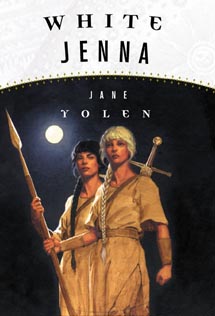
White Jenna
ISBN# 0-312-93195-6 Tor hardcover
ISBN# 0-812-50907-2 Tor paperback
ISBN# 0-765-34358-4 Tor Teen paperback
The sequel to Sister Light, this actually contains the chapter based on a short story of the same name written for Jessica Amanda Salmonson’s anthology “Heroic Visions.” Published in 1989, White Jenna and its companion Sister Light comprise one single book. In the late 90s, the two would be put together as The Books of Great Alta. (My husband always contended it was a single book and I had had a crisis of faith about writing such a long piece.) The book is broken into sections: the story, the ballad, the history, the tale, etc. Each part goes toward telling the story of the young white-haired Jenna who is a child of prophecy called upon to reunite the broken kingdom of the Dales. The book is feminist and humanist at its core. The major magic set piece is that the women who live cloistered in Hames can call forth their shadow sisters, that Other side that makes them whole. All artfully (I hope) disguised as a novel of sword and sorcery. Eventually I wrote a third book (I thought killing off all the main characters would keep me from committing a trilogy, but those pesky critters have their own ideas!) Called The One Armed Queen, it takes the story one step further. There are Spanish and Japanese editions, and the book was a Nebula nominee. The Science Fiction Book Club published its own version of The Book of Great Alta.
Accolades:
- Runner up–Nebula Award 1991
- Nominee for the Utah Young Adults’ Award in 1993
What reviewers have said:
- “Yolen weaves a magical tale with wry, true-to-life observation, poetry, and a touch of wit.” — Publisher’s Weekly
- “Yolen has a done a marvelous job of balancing here: light and dark, history and folklore, cracks at academia and brilliant storytelling all interwoven to make a tale as complex and beautiful as the most intricately braided hair. The story reads on several levels: as a gripping adventure of strong women who change their world, a condemnation of academics who can’t see beyond their own noses, and an object lesson is how events get changed in the retelling, and as an allegory of how women have to hide parts of themselves to function in today’s world and embrace those same parts to become whole.” — Locus Magazine